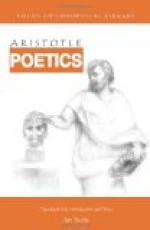XXIV
Again, Epic poetry must have as many kinds as Tragedy: it must be simple, or complex, or ‘ethical,’ or ‘pathetic.’ The parts also, with the exception of song and spectacle, are the same; for it requires Reversals of the Situation, Recognitions, and Scenes of Suffering. Moreover, the thoughts and the diction must be artistic. In all these respects Homer is our earliest and sufficient model. Indeed each of his poems has a twofold character. The Iliad is at once simple and ‘pathetic,’ and the Odyssey complex (for Recognition scenes run through it), and at the same time ‘ethical.’ Moreover, in diction and thought they are supreme.
Epic poetry differs from Tragedy in the scale on which it is constructed, and in its metre. As regards scale or length, we have already laid down an adequate limit:—the beginning and the end must be capable of being brought within a single view. This condition will be satisfied by poems on a smaller scale than the old epics, and answering in length to the group of tragedies presented at a single sitting.
Epic poetry has, however, a great—a special—capacity for enlarging its dimensions, and we can see the reason. In Tragedy we cannot imitate several lines of actions carried on at one and the same time; we must confine ourselves to the action on the stage and the part taken by the players. But in Epic poetry, owing to the narrative form, many events simultaneously transacted can be presented; and these, if relevant to the subject, add mass and dignity to the poem. The Epic has here an advantage, and one that conduces to grandeur of effect, to diverting the mind of the hearer, and relieving the story with varying episodes. For sameness of incident soon produces satiety, and makes tragedies fail on the stage.




